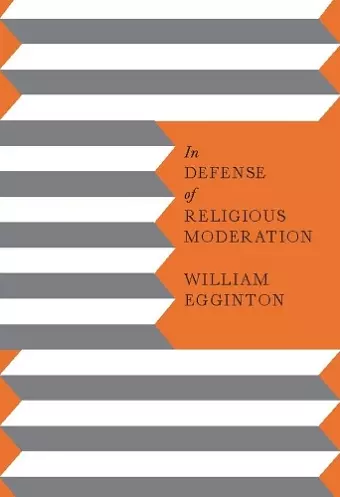In Defense of Religious Moderation
Format:Hardback
Publisher:Columbia University Press
Published:8th Jul '11
Currently unavailable, and unfortunately no date known when it will be back

Egginton questions whether fundamentalists and atheists truly oppose each other, as they both believe that the methods we use to understand the world are all versions of an underlying master code. The most effective weapon against such thinking is religious moderation, a way of believing that questions the very possibility of a code of codes. The moderately religious are best suited to protect science and politics from fundamentalist attack. William Egginton laments the current debate over religion in America, in which religious fundamentalists have set the tone of political discourse-no one can get elected without advertising a personal relation to God, for example-and prominent atheists treat religious belief as the root of all evil. Neither of these positions, Egginton argues, adequately represents the attitudes of a majority of Americans who, while identifying as Christian, Jewish, or Muslim, do not find fault with those who support different faiths and philosophies. In fact, Egginton goes so far as to question whether fundamentalists and atheists truly oppose each other, united as they are in their commitment to a "code of codes." Fundamentalists-and stringent atheists-unconsciously believe that the methods we use to understand the world are all versions of an underlying master code. This code of codes represents an ultimate truth, explaining everything. The moderately religious, with their inherent skepticism toward a master code, are best suited to protect science, politics, and other diverse strains of knowledge from fundamentalist attack and to promote a worldview based on the compatibility between religious faith and scientific method.
In his latest book, William Egginton laments the current debate over religion in America, in which religious fundamentalists have set the tone of political discourse-no one can get elected without advertising a personal relation to God, for example-and prominent atheists treat religious belief as the root of all evil. Neither of these positions, Egginton argues, adequately represents the attitudes of a majority of Americans who, while identifying as Christians, Jews, and Muslims, do not find fault with those who support different faiths and philosophies. In fact, Egginton goes so far as to question whether fundamentalists and atheists truly oppose each other, united as they are in their commitment to a "code of codes." In his view, being a religious fundamentalist does not require adhering to a particular religious creed. Fundamentalists-and stringent atheists-unconsciously believe that the methods we use to understand the world are all versions of an underlying master code. This code of codes represents an ultimate truth, explaining everything. Surprisingly, perhaps the most effective weapon against such thinking is religious moderation, a way of believing that questions the very possibility of a code of codes as the source of all human knowledge. The moderately religious, with their inherent skepticism toward a master code, are best suited to protect science, politics, and other diverse strains of knowledge from fundamentalist attack, and to promote a worldview based on the compatibility between religious faith and scientific method.
The argument made by William Egginton on behalf of religious moderation is a clear, nuanced, and important one. It shows how the critique of religion offered by well-known atheist authors is guilty of the same fundamentalist logic of which they are so critical. Egginton writes with great ease and clarity, and his many examples drawn from legal cases, popular culture, and his own personal experience will resonate with readers. -- Jeffrey Robbins, Lebanon Valley College, author of Radical Democracy and Political Theology William Egginton has produced an up-to-date account of the political nature of religion to remind us all that Samuel Huntington's clash of religious civilizations may not only be contrasted by religious moderation but also actually avoided. Following on Richard Rorty's and Gianni Vattimo's postmetaphysical weak thought, Egginton dismantles theistic, atheist, scientific, and philosophical arguments that try to accuse such moderate faith of irrationalism, relativism, or nihilism. A genuine must-read for all those concerned with the violent religious groups emerging in our societies. -- Santiago Zabala, ICREA/University of Barcelona, author of The Remains of Being: Hermeneutic Ontology After Metaphysics A literary rally to restore sanity in religion... temperate and thoughtfully researched. Kirkus Review This treatise is no easy read, but the conclusion is a comfort: People of faith must be tolerant. Star-Ledger Egginton's book is a very useful resource for survey or elective undergraduate courses. Highly recommended. Choice
- Winner of Choice Outstanding Academic Title 2012
ISBN: 9780231148788
Dimensions: unknown
Weight: unknown
176 pages